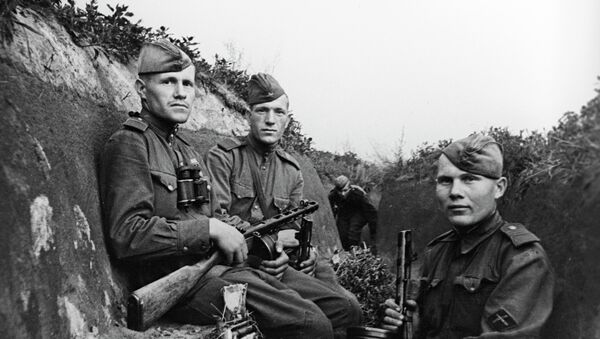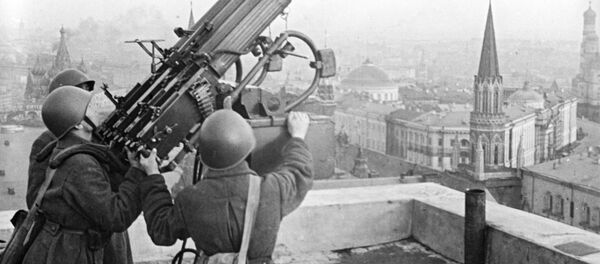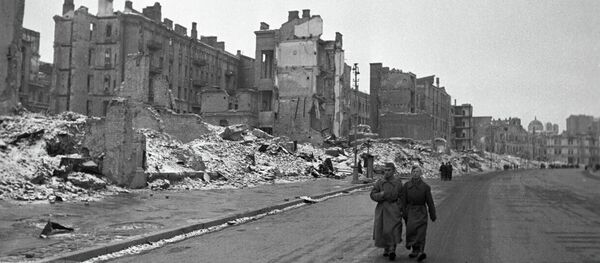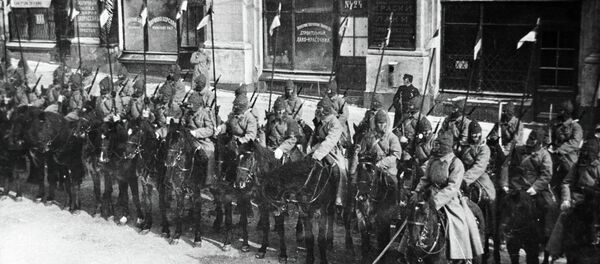Leonid Sigan, Head of Sputnik Poland: I was the first broadcaster to announce the liberation of Warsaw
Leonid was going to enlist in 1943. But with his knowledge of Polish, his found his frontline in an office — something he was originally very upset with.
"My entire family, which had stayed behind in Western Ukraine, had died. I was so disappointed — they wouldn't let me fight, and not because I wasn't fit for duty. It was on Stalin's orders that people from Belarus and Western Ukraine were kept away from the frontlines. Now, I look back and proudly think that even though I wasn't in the trenches, I was still useful."
"There was a rule — whenever something major happened, there would be an order from the Supreme Commander-in-Chief, and then Levitan would broadcast it."
But Leonid was lucky — one night, he was called into work and told of a very important task.
"I was given this document and told to go on air. I took a look at it and realized it was news of the liberation of Warsaw! Afterwards, Levitan — who was always very nice to me — jokingly wagged his finger at me every time we met. Because I was the only person in the Soviet Union to have beaten him to a news announcement."
Anna Akopova, Sputnik Germany
My grandfather was just 18 years old and studying in the Krasnodar military academy. It was the year the Stalingrad siege began, and Joseph Stalin ordered military academies to send their students to the frontlines. Three months later he was wounded in action and transferred to a military hospital in Siberia.
"I couldn't write at all because of my injury. So I couldn't even send a letter home, to tell my family that I was alive. Later I found out that they'd actually sent a killed-in-action notice to my village. But my father, he refused to believe it. He said ‘I know my son is alive, because when I go outside, the birds start singing'."
"On March 15, we were clearing minefields in Germany, before our last offensive. I cleared 25 mines in 20 minutes. And on April 4, 1945, our division took Baden — and Stalin issued an order, congratulating us."
Just a month later, Grigory Khachaturov and his fellow servicemen would reach Czechoslovakia, where they were greeted as heroes. Three months later, Georgy headed home.
Anton Bespalov, Sputnik International
Yakov Bespalov was the luckiest of my great-grandfathers, three of whom went to war (why three? the fourth, a WWI veteran, was really too old for that). His war started in 1941 and ended in 1945, he came back home and reunited with his family.
What I know about him (apart from the few family legends), I know mostly from archive documents, thanks to the tremendous work done by Russian archivists who in recent years have digitalized millions of wartime records — about those who were killed and decorated during WWII.
The records reveal that he fought in the battle of Moscow, in Belarus, Ukraine, Poland, Hungary, and Austria, driving, repairing tanks and trucks, and running a maintenance base. Meanwhile, his wife and two sons remained (and luckily survived) in the Nazi-occupied Ukraine and I can only imagine what he felt when he left them behind.
In February, 1945 he was awarded with the Order of the Red Star — and today, thanks to the online archive records — I can read what for. "On 12.02.45 during the delivery of intel to the corps HQ his car was shelled and hit by enemy artillery, nevertheless he delivered the important information on time, ensuring timely delivery of fuel and spare parts to the unit… between February 15 and 18 he personally repaired 3 M4A2 tanks."
Today, thanks to another amazing new project, which enabled me to track him as he roamed across Europe, I found out that he really did end his war in Vienna, just as the family legend ran.
Elena Kovalenko, Sputnik Italy
In 1941, 17-year-old Olga Lysianskaya was forced to leave her orphanage in Kiev after the Soviet army had retreated from the city. Without much food and sleep the girl walked all the way to Voronezh where she undertook guerilla training. Soon enough, Nazi troops reached Voronezh and began bombing the town.
After the war Olga lived in Moscow and worked as a physicist at Moscow State University. She was awarded with countless medals by the Soviet Union and Czechoslovakia while being sure that there was nothing heroic about her biography. Olga passed away in 2009.
Kirill Vysokolov, Sputnik International
My great-grandfather Sergei Uchayev was conscripted into a Red Army railway regiment in 1938 and was retained in the military after the war began in 1941. He was stationed in the far-eastern Khabarovsk region as part of a reserve force to fend off a possible Japanese invasion.
He was transferred to the Eastern Front in 1944, when the tide of war turned against the Axis. As a train engineer, he and his crew drove "emergency trains" with supplies for the reconstruction of railways as the army advanced. Emergency trains were the first to enter frontline areas
He took part in the liberation of Poland's Lublin and Warsaw, where he drove the first Red Army train into the city, as well as the taking of Berlin, where he left his name on the Reichstag.
After victory over Germany, he was transferred to the Pacific Island of Sakhalin to fight against Japan. He was finally demobilized and became a civilian train engineer in 1946.
He did not share his experiences of the War as paying homage to veterans did not become customary until Leonid Brezhnev became general-secretary in 1964. Unfortunately, he died of illness the same year.







